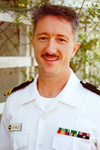Graduate to make sure patients get what they need
by Dawn Brazell
Special to The Catalyst
The best lessons in life often come from our wounds.
That’s literally the case with David Crumbley, who joined other MUSC graduates last Friday as he received his masters as a clinical nurse specialist of adult health. His next stop as a naval officer is to serve in Puerto Rico for three years. Crumbley, who was instrumental in setting up a nurse-managed wound clinic at Naval Hospital Charleston, said he’s excited because he feels he has the tools he needs to help nurses take better command of case management.
 David
Crumbley, 39, got his training on the battlefields, so to speak.
David
Crumbley, 39, got his training on the battlefields, so to speak.
A certified wound care nurse at the wound clinic at Naval Hospital Charleston (NHC), he found himself face-to-face with many retired military patients who had stories out of the history books.
“I would hear stories from the sinking of the Yorktown … to the battles of Iwo Jima and Midway to bombers who flew over Europe—all these major events, and it was just great. I viewed them as my heroes. To see them get better and walk out was very rewarding. They just gave me energy when they came in.”
Getting the nurse-managed wound clinic established took hard work.
Crumbley was selected in the fall of 1995 to attend a wound care specialty course at MUSC. The course combined classroom and clinical instruction designed to prepare registered nurses to manage acute or chronic wounds and pressure necrosis, vascular ulcers, diabetic ulcers and fistulae. When Crumbley returned to the surgery clinic at NHC, he assisted the surgeons in caring for patients with chronic wounds and served as a consultant for patients with complex wounds. This meant initially that he practiced out of the surgery clinic, assisting with a variety of wounds.
As the number of consultations grew, this became a full-time position. By January 1996 the wound clinic was managing more than 200 patients per month, and it became necessary to establish a clinic area with specialized lighting and equipment. Crumbley said the clinic was a success because it helped patients get the follow-up care and management they needed and freed up surgeons to spend more time in the operating room.
There are certain types of patients, such as the elderly, the physically disabled and those with multiple chronic diseases, who really benefit from nurse-managed care, he said. People with chronic and complex wounds frequently require extensive interventions. Sporadic and fragmented care from various providers is not the best way to handle this population. The success at the wound clinic helps confirm this. Crumbley, who was invited to present at the ANA Biennial Symposium in 1998 and at several military conferences, hopes to see more nurse-managed wound care clinics established nationally.
Training for triathlons in his spare time, Crumbley got his bachelor’s degree in physical education from Georgia State University. He started a wellness program at a hospital in northwest Georgia. Wanting to enhance his skills, he got a nursing degree from Floyd College, and received his naval commission in 1993. He spent two-and-a-half years in the wound clinic at NHC and then began studying for his master’s degree fulltime at MUSC as part of the military’s duty under instruction program.
His goal is to identify health programs working well nationally and see them implemented in the Navy, one of the largest managed care systems in the world. One of the problems with such a system is managing the incredible amount of health information that exists, he said. He’s interested in using computer technology to develop stronger health information networks.
“If you have all this information, but can’t access it, then what is the point? I want to manage it so that everyone comes out winning.”
His focus will remain on exploring how nurse-managed programs can lead to better health care for patients and less stress for physicians. Crumbley said it’s often the small things, which seem like no big deal, that get overlooked and can really harm patients over the long run. It’s making sure a patient gets fitted for orthotics or goes for that mammogram screening that can make a big difference.
“It’s the wrench in the cogs, and it brings everything to a stop.” Often patients, especially with chronic or multiple health problems, fall through the cracks.
“It’s making sure the patients get what they need, when they need it.”